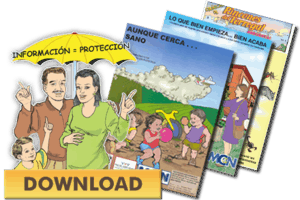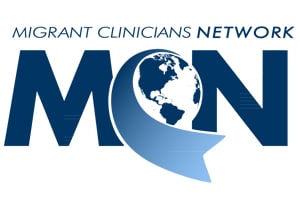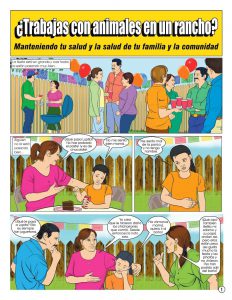JUNE 2019
 Building positive working relationships and partnerships is a key to success
Building positive working relationships and partnerships is a key to success
UMASH is a collaboration of five leading research and health care institutions in the Upper Midwest, one of which is the Migrant Clinicians Network (MCN). MCN has been a part of UMASH since the beginning of the center in 2011 and is instrumental in our UMASH initiative of reaching immigrant farm workers with health and safety information.
One effective educational method used by MCN is the use of comic books to illustrate complex topics in a user friendly format. MCN has used this method to educate Spanish speaking workers on the issue of zoonotic diseases, which are defined as infectious diseases that are spread between animals and people.
Read on to learn more about this popular education tool and how you can access these resources.
Reaching Immigrant Workers through Popular Education
Sofia Carrasco
Migrant Clinician Network Intern
Migrant Clinicians Network
From milking cows on a dairy farm, to raising pigs and chickens, to processing poultry or packing meat in a factory, agricultural jobs, often held by immigrant workers, are critical to the food industry, but workers risk exposure to disease-causing bacteria that can make them ill. In fact, research conducted by UMASH partner, the Minnesota Department of Health, found that those who live or work on a farm with food animals are 8 times more likely to get sick with a zoonotic enteric infection (Salmonella, Campylobacter, E. coli, Cryptosporidium) than Minnesotans who do not live or work on a farm.
Migrant Clinicians Network is dedicated to helping these workers and their families lead healthier and safer lives, on and off the job. One of the ways we do this is through popular education including comic books that promote health and safety messages to workers. “Working With Farm Animals: Keeping Yourself, Your Family, and Your Community Healthy” is one of our newest comic books that focuses on zoonotic diseases and illustrates how workers can protect themselves, their friends, and their family from spreading bacteria like E. coli and salmonella. These germs can not only infect the worker, but can be brought home on the skin, clothing, or shoes, and can be spread to others unknowingly. This comic book focuses on hygiene, such as washing hands and clothes when returning home, in order to prevent the spread of bacteria.
Popular education respects and incorporates the experiences and realities of the participants, rather than a one-size-fits-all educational approach.
MCN’s approach to popular education includes a wide breadth of techniques including emphasis on community health workers and participatory training methods. Popular education respects and incorporates the experiences and realities of the participants, rather than a one-size-fits-all educational approach. MCN has adopted this approach by creating educational resources like comic books that are easy to absorb and that recognize the reality of workers’ home lives and how they could potentially bring pathogens home. Our comic books bridge the literacy gaps of workers, while also presenting the information in an attractive way for both workers and their families to understand.
MCN also conducts trainings that utilize resources, activities, and learning methods that value the participants’ life experiences. Participants can then take in the knowledge we provide and relate it to their everyday lives.
“For over 30 years, MCN has incorporated popular educational approaches into so many of our resources and interventions targeting immigrant workers and their families because it has been so effective in helping to communicate and reinforce important health and safety messages,” says Amy Liebman, MPA, director of environmental and occupational health at MCN and co-director of the UMASH project, Promoting Safety and Health for Immigrant Dairy Workers.
MCN offers many other bilingual comic books on range of topics.
“Safety and Health on the Farm” is available in both English and Spanish and is tailored to individual states like Minnesota and Wisconsin. There are also comic books that focus on women and children, everyday worker health and safety and pesticide exposure. The pesticide comic books are available on the MCN website.


